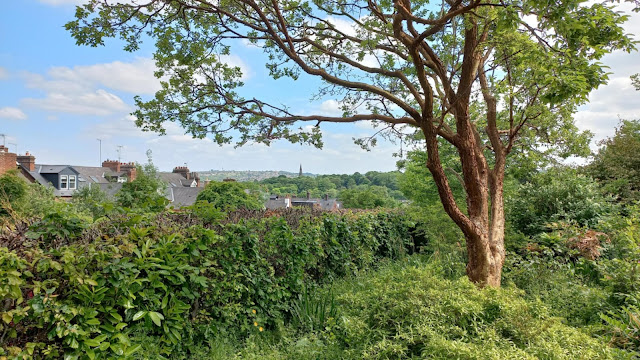Sheffield Botanical Garden
Synchronicities ....
As I took part in the second artbook fair in Nottingham this year, I met Rosemary Watson who invited me to talk about my work in her group Artists Book Club Sheffield. Jude, one of the participants, happened to be a volunteer guide at the Sheffield Botanical Garden. She kindly invited us for a visit last May. We admired and smelt all the flowers and I pretended to know the name of a few ... I would say that my knowledge of plants is more emotional than horticultural....
While it is generally recognised that the problems of urban overcrowding and epidemics in the nineteenth century eventually led to a realisation of the need to provide open spaces in industrial towns, it is interesting to note that the Sheffield Botanical and Horticultural Society Garden was open only to subscribers and the site selected was in a spacious middle class suburb, well away from the overcrowded working class area of the city. Even as late as 1852 a motion to admit the working classes to the grounds once a week at a low cost was defeated by the town council. In fact, the Botanic Gardens were not freely open to the public until 1898 when the property was transferred to the Sheffield Town Trust."
Extract from "The Sheffield Botanical Garden" by Ian Carder
I was glad to see that in 2025, the garden is free to access and that eveyone can enjoy its lawns and secret corners. It's a very beautiful park on the top of a hill where the city disappears from the view.
Silk tree - albizia julibrissin - Tropical dream
This is a tree that has become very popular in France in these last two decades (at least where I am from, Nantes) and we see a lot of them in bloom in people's gardens in summer. I have noticed how bright the colours are from the leaves and flowers when used in botanical prints. I was curious about the name "Tropical dream" but only found this :
"The Albizia julibrissin 'Tropical Dream' variety, also known as the Persian Silk Tree or Mimosa, was selected by plant collector Johan Possemiers from a batch of seeds."
The "Tropical Dream" variety of Albizia julibrissin, also known
as the Persian Silk Tree, was
selected from trees in Seoul, South Korea, that thrive in cold
conditions. The name "Albizia" comes from Filippo degli
Albizzi, an Italian nobleman who introduced the tree to Europe in the mid-18th
century. The species name "julibrissin" is a corruption of the
Persian phrase "gul-i abrisham," meaning "silk flower" (AI
overview)
A tree that surprised me with its flowers looking like and smelling like mimosa but with completely different leaves. An Azara, according to Google as I forgot to take the name.
Subtropical green houses
"Tropical or equatorial houses would be too costly to maintain", said Jude .
I find interesting to photograph the heating system.
Without extra energy to keep them at the temperature of their place of origin, these plants would die. Enjoying the beauty of these plants in our northern countries is a luxury that is not 100% environment-friendly.













Comments